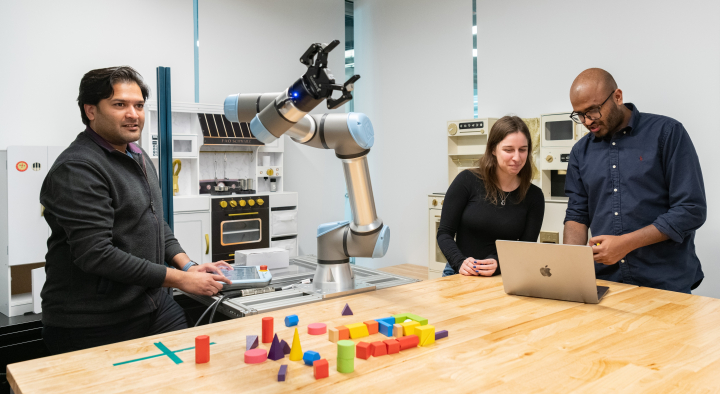UMD Researcher to Advance AI Using Powerful Federal Computing Resources
Abhinav Shrivastava, an assistant professor of computer science, is principal investigator for one of only 35 projects nationwide selected to jumpstart the National Artificial Intelligence Research Resource (NAIRR) program.
NAIRR is a joint effort between the U.S. National Science Foundation (NSF) and the Department of Energy (DOE). It provides powerful computing resources to U.S. researchers exploring topics like deepfake detection, advanced AI safety, next-generation medical diagnoses, and other critical AI priorities.
“NAIRR is driven by the need to advance responsible AI research and broaden access to cutting-edge resources needed for AI research,” said NSF Director Sethuraman Panchanathan in announcing the pilot program on May 6. “It symbolizes a firm stride toward democratizing access to vital AI tools across talented communities, all of whom are working to unlock the full potential of AI for the benefit of humanity and society.”
Shrivastava, working with his graduate students, has been allotted 100,000 node hours (each node represents a networked computing cluster) on the Summit supercomputer located at the DOE’s Oak Ridge National Laboratory. The UMD team will use their computational runtime to expand AI research involving computer vision and machine learning.
Specifically, they will focus on developing unsupervised unified models for generative and discriminative computer vision tasks, which is the ability to generate—as well as distinguish—a wide range of concepts. Improving this process is vital, as AI-based computer vision systems continue their rapid growth in everything from self-driving vehicles to complex manufacturing processes.
But building AI systems that can generate images of objects with high-fidelity and accurately recognize minute details in similar looking objects—is that a 5/16-inch fastener or quarter-inch fastener needed to secure a jet engine cowling, for example—requires massive amounts of training. And sometimes the training needed is too large for even the most powerful computing systems located at many research universities.
That’s where the NAIRR project comes in, Shrivastava said.
The Summit system can perform operations at speeds of up to 200 petaflops, making it one of the fastest supercomputers in the world. To put that in human terms, approximately 6.3 billion people would all have to make a calculation at the same time, every second—for an entire year—to match what Summit can do in just one second.
“This is a tremendous opportunity, particularly for my students, to access powerful computing resources that are not always available in most academic settings, allowing our team faster and possibly more accurate results,” said Shrivastava, who has a joint appointment in the University of Maryland Institute for Advanced Computer Studies. “Ultimately, we believe this work will significantly improve the accuracy and reliability of these generative and discriminative models, which we plan to release as open-source data.”
In addition to his tenure-track appointment in computer science, Shrivastava (left in photo) is part of the NSF-funded Institute for Trustworthy AI in Law & Society and is a core faculty member in Center for Automation Research and an affiliate member in the University of Maryland Center for Machine Learning.
The NAIRR review committee that approved Shrivastava’s proposal noted his extensive experience in computer vision, generative models, and neural representations.
This includes a $2.5 million award from the Defense Advanced Research Projects Agency (DARPA) in 2020 to teach AI systems how to adapt in evolving situations in the real-world, and an NSF CAREER award in 2023 to develop innovative technologies for computers to better understand temporal phenomena, the term used to describe observable changes over time.
—Story by UMIACS communications group
The Department welcomes comments, suggestions and corrections. Send email to editor [-at-] cs [dot] umd [dot] edu.
